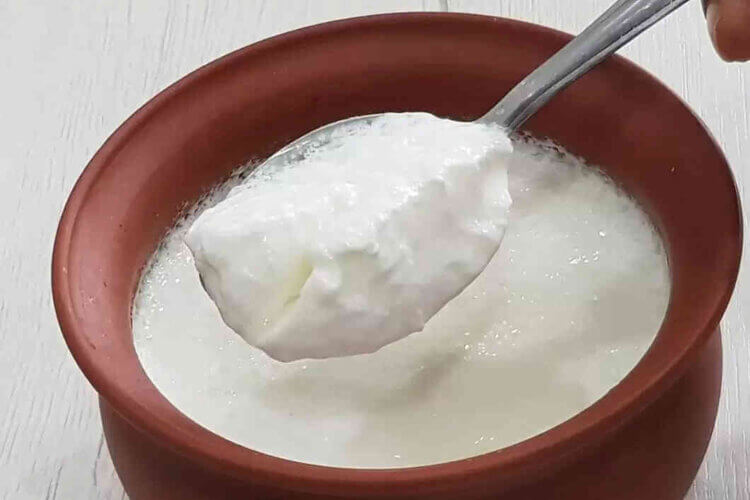Curd is a nutrient-dense food that provides several health benefits when consumed on a regular basis. Curd is created through a fermentation process in which bacteria such as Lactobacillus sp., Lactococcus sp., and Streptococcus sp. convert lactose in milk to lactic acid, giving curd its distinctive sour flavor.
One of the main advantages to incorporate curd in your regular diet is that it improves digestion. Curd, as a probiotic food, includes live bacteria that assist maintain a balance in the acid levels of the stomach, making it a useful cure for indigestion.
Curd has been proven in studies to change gut microbiota composition, hence lowering low-grade gut inflammation, weight gain, and the risk of insulin resistance.
A bowl of curd is one of the most comforting foods for most people since it is cooling, nourishing, light, and relaxing. Adding this dairy product to foods such as salads and smoothies makes them both tasty and healthful. Curd is used as a marinade for meat and kebabs in India, as well as in gravies and curries. Aside from being delicious, it is also high in critical vitamins and minerals.
Learn more about the health advantages of curd and why it is a good addition to your regular diet.
Health Benefits of Curd
Curd is high in vitamins B2 and B12, as well as calcium, magnesium, and potassium. It is not only beneficial to one’s health, but it is also an excellent moisturizer for the skin. Here are some of the many health benefits of curd.
1. Increases Immunity
Curd has a lot of active bacteria, which aids in the battle against disease-causing pathogens. Aside from that, the curd is high in protein, vitamins, and lactobacillus, all of which enhance immunity. Curd contains probiotics, which help to keep one’s gut healthy. However, before purchasing curd, look for the phrase ‘live active culture’ on the label to ensure that it contains probiotics.
2. Promotes Healthy Digestion
Curd is easy to digest, and even lactose intolerant persons can consume it. Lactose is broken down during the fermentation process. Apart from that, it also has beneficial bacteria present in it, which can help soothe an individual’s inflamed digestive system and treat an upset stomach.
3. Promotes Healthy and Glowing Skin
Curds are a great ingredient for face masks. It contains lactic acid, which serves as an exfoliant and aids in the removal of dead skin cells. It has the potential to organically moisturize and heal dry skin. Curd consumption on a regular basis helps improve the glow and gloss of one’s complexion and hair.
4. Beneficial to the Heart
Another advantage of eating curd on a daily basis is that it helps lower cholesterol levels, as well as hypertension and the risk of developing high blood pressure. It maintains the heart healthy and active by keeping cholesterol levels in check.
5. Helps to prevent vaginal infections
Curd has a robust bacterial culture, which is essential for a healthy vagina. It balances the vaginal PH and enhances its health. It is made up of lactobacillus that restores the yeast balance in the vagina. Additionally, it helps to control the growth of infections in one’s body and produces a chemical called hydrogen peroxide that aids in killing the yeast.
6. Enhances Bone and Teeth health
Yogurt gives a significant amount of calcium to the body, which helps to strengthen bones and teeth. It also helps to keep arthritis and other bone-related problems at bay.
7. Helps in weight loss
Due to its high calcium content, curd consumption can reduce cortisol production and aid in weight loss. The waistline collects extra fat as a result of an unbalanced lifestyle and an imbalance in the hormone cortisol. Curd regulates cortisol production. It also delivers a long-lasting feeling of fullness, lowering calorie intake.
8. Provides Energy
Curd is also an energy enhancer due to its high vitamin and mineral content. It serves as an an excellent pre- and post-workout session. Moreover, it also works as an antioxidant and aids in fast recovery after an intense workout session.
9. Keep Blood Sugar Levels in Control
Blood sugar levels are controlled by easily digestible protein and live yoghurt culture in curd. Greek yoghurt is especially known for reducing the risk of heart diseases and controlling blood sugar in people with diabetes.
What Are the Side Effects of Overeating Curd?
Although curd comes with several health benefits, overconsumption of curd can be risky and have side effects, such as –
- Curd can be heavy for some people and thus can cause constipation and bloating.
- Overeating curd can lead to weight gain.
- Increasing the risk of joint pains.
Who Should Avoid Eating Curd?
- Individuals who suffer from acidity, acid reflux problems, or indigestion, should avoid curd at night.
- People who are lactose intolerant and find difficulty in digesting curd should avoid it as well.
- Apart from that, individuals who are prone to cold and cough should also avoid consuming curd at night due to its mucus-encouraging properties.
- Individuals who are obese should avoid the intake of too much curd
- Individuals having arthritis should also avoid overconsumption of curd as it can increase their joint pain. Sour foods alleviate arthritis and joint pain.
Individuals should also remember to consume curd in its natural state. Adding sugar to it will improve the flavor but make it unhealthy. To make it more tasty, consider adding honey or other dried fruits.
To summarize, the following are the health benefits of curd. It is a nutrient-dense, energy-dense food that delivers nutrients while being low in calories. To be healthy, in addition to eating a good diet that contains curd, one should exercise and have a balanced lifestyle.







 Finance
Finance







